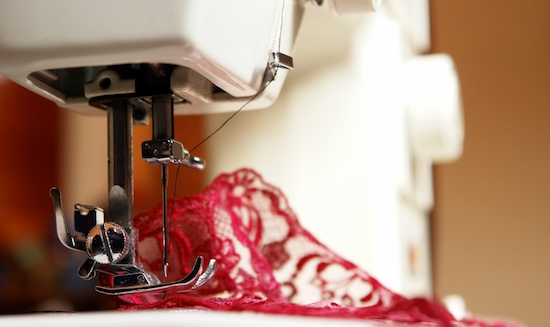Sewing Machines: What to Know Before Purchasing as a Novice Sewer
January 13, 2012
Is learning to sew one of your new year’s resolutions? Looking to be a little more crafty this year? Here’s the information you should know before purchasing a sewing machine.
A beginner should always keep their sewing machine simple. Beginners need straight-forward machines without fewer options to confuse them while they learn. A straight stitch machine with up to ten different stitches would do. Computerized machines are not usually a beginner’s friend.
Buy Second-Hand or New?
You might be surprised and even disagree with my take on this, but I suggest buying second hand. Older machines were built much differently than current ones. If you go in to your local big box store, chances are you will find a shiny machine with nylon gears inside. Nylon gears strip easily. These machines are what I consider “disposable.” Make sure the gears inside your machine are made from metal. Do your homework, even browse eBay to get an idea what’s out there and how much you might pay. I have found thrift stores are excellent places to find second hand machines. Garage sales, yard sales, flea markets etc. Just because a machine is old, does not necessarily mean it is “tired.”
If you decide you want a new machine, find a knowledgeable dealer who can recommend a suitable machine for your skill level and budget. Quite often, the dealer offers basic sewing classes to anyone who purchases a machine from them. These lessons can be invaluable to a beginner. They learn to sew at the same time they are getting to know their machine. Every single machine has it’s own individual “personality” complete with quirks and preferences.
What Else to Look For?
Make sure the manual is available (or that you an download it online). It’s important to have the manual, especially as a beginner, because you’ll find threading instructions, operating instructions, and ways to troubleshoot your particular machine.
Try to test the machine before you buy it. Nothing is more frustrating to a new sewer than to try to learn using a sewing machine that does not work properly. Make sure all the parts to the machine are there as well. Presser feet, foot pedal, shuttle, belts, etc. Determine whether or not the electrical cord is in excellent and pliable condition. If everything is not in working condition, make sure you can easily obtain parts from a local machine dealer or online.
What Will You Be Sewing?
If you want to sew garments using knits, cottons, polyester, nylon, and other common fabrics, you can purchase a basic domestic machine. A domestic machine is a machine that most people use at home. If you want to sew heavier things like leather garments, canvas, upholstery, or heavyweight denim, consider buying an industrial machine that has a motor that can handle those projects.
Beware of labels on domestic machines that tout “heavy duty.” It may not be. Look to see how much power it has compared to a typical domestic machine by finding the information plate attached usually to the back of the machine. The plate should have the serial number, model number, and number of amps, volts, and watts it uses.
Hopefully these tips help you when it’s time to purchase your first sewing machine.




